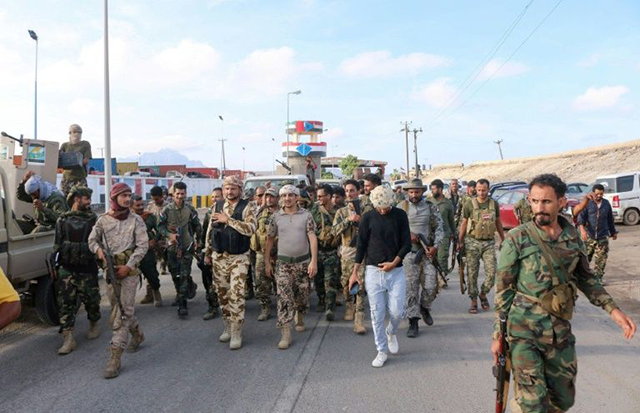You are here
Yemeni separatists abandon self-rule, push peace deal
By AFP - Jul 29,2020 - Last updated at Jul 29,2020
RIYADH — Yemeni separatists abandoned their declaration of self-rule in the south on Wednesday and pledged to implement a stalled Saudi-brokered peace deal, mending a rift between allies in the war against Houthi rebels.
The Southern Transitional Council (STC) proclaimed self-governance in April after accusing the government of failing to perform its duties and of "conspiring" against the southern cause, pushing the war-ravaged country deeper into crisis.
The breakdown between the one-time allies had complicated a long and separate conflict between a Saudi-led military coalition and the Iran-allied rebels, who control much of the north, including the capital Sanaa.
The STC "announces that it is abandoning its self-rule declaration" to allow the implementation of a power-sharing deal known as the Riyadh Agreement, spokesman Nizar Haitham wrote on Twitter.
He acknowledged the announcement came after Saudi Arabia and the United Arab Emirates exerted pressure to row back on their decision.
Saudi Arabia said it had proposed a plan to "accelerate" the implementation of the Riyadh Agreement, the official Saudi Press Agency (SPA) reported early on Wednesday.
The plan calls for the Yemeni prime minister to form a new government within 30 days, as well as the appointment of a new governor and security director for second city Aden where the government had set up base.
"Once this is implemented, the government should commence its work in Aden, and oversee the completion of the implementation of the Riyadh Agreement in accordance with all its clauses and tracks," SPA said, citing an unnamed Saudi official.
'United response'
Yemen's internationally recognised government welcomed the announcement, with spokesman Rajeh Badi expressing hope that this would be a "serious and true start" to implementing the Riyadh Agreement.
Yemeni President Abed Rabbo Mansour Hadi, exiled in Riyadh, instructed Prime Minister Moeen Abdulmalik Saeed to form a new cabinet and announced the appointment of a new police commander and governor for Aden.
If it holds, the breakthrough should allow the Saudi-led coalition and its allies to refocus their energies on the war against their common foe — the Houthi rebels.
"This largely means the Saudis want to de-escalate in Yemen and push the warring parties towards peace," Fatima Abo Alasrar, a scholar at the Middle East Institute, told AFP.
"Currently, without a united response, the Saudis, the Yemeni government and the STC are on the defensive in the war, not offensive, because the Houthis are attacking their areas with impunity."
The breakthrough, after months of impasse, shows the "possibility of resolving Yemeni differences through dialogue without the use military force", Deputy Defence Minister Prince Khalid Bin Salman said on Twitter.
Saudi Foreign Minister Prince Faisal bin Farhan hailed the development as a "positive step", saying it will strengthen trust between the allies and allow the government to resume its work in Aden.
'War within a war'
The tussle for control of the south had exposed divisions between the coalition partners — Saudi Arabia, which backs the government, and the United Arab Emirates, a backer and funder of the STC.
Yemen's separatists, who have long agitated for independence in the south, had signed the power-sharing deal in Riyadh last November.
It sought to quell the "civil war within a civil war" and was hailed as a possible stepping stone towards ending the wider conflict.
The agreement came after deadly clashes broke out in August between the government and STC forces who seized control of Aden, ousting unionist forces who had set up base there when Hadi fled the Houthi-held capital Sanaa in February 2015.
But the Riyadh pact quickly became defunct, failing to meet deadlines for key measures including forming a new Cabinet with equal representation for southerners, and the reorganisation of military forces.
Wednesday's breakthrough comes as Houthi rebels are again on the offensive against government forces, with no end in sight to Yemen's long conflict.
Tens of thousands of people, mostly civilians, have been killed and millions displaced in what the United Nations has called the world's worst humanitarian disaster.
The Arab world's poorest country, already devastated by conflict and malnutrition, also faces the coronavirus pandemic that its decrepit health system is ill-equipped to handle.
Related Articles
ADEN — Fighting broke out on Monday between government troops and separatists in southern Yemen, officials said, in the first major clash si
ADEN — Yemeni separatists early Sunday declared self-rule of the country's south as a peace deal with the government crumbled, complicating
RIYADH — The Saudi-led military coalition in war-torn Yemen on Monday rejected a declaration of self-rule by separatists in the country's so














